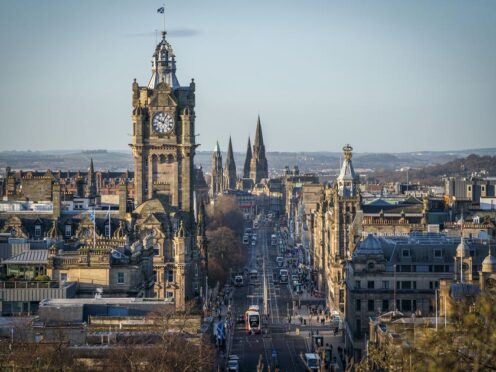
Three out of five people are “totally in favour” of introducing a visitor levy on accommodation in Edinburgh, a survey for council chiefs in the capital has found.
However less than a quarter (24%) of visitors who responded to Edinburgh City Council’s questionnaire gave the move their complete backing.
With Holyrood considering legislation which, if passed, would give local councils the power to charge a levy on overnight stays, the authority asked residents and others for their views.
A total of 3,941 people took part in the survey – 80% of them residents and 13% visitors, while the remaining 7% had “other connections” to the area.
The research, carried out between November 2023 and January, found that “overall, the majority of respondents were supportive of introducing a visitor levy in Edinburgh” – with 85% giving a “more supportive rating” while 60% were “totally in favour”.
However the report, prepared for councillors who will discuss the issue at a meeting on Tuesday, noted “visitors were less supportive”, with 53% of respondents in this group giving a “more supportive rating”, while “only 24% were totally in favour”.
Half (50%) of those who responded favoured making the levy a percentage of the accommodation costs, while just over a third (36%) preferred having flat rate fee.
Looking at the level any levy should be set up, a 5% charge was backed by 38% of residents, 23% of visitors and 25% of all other respondents.
The next most popular charge levels were 3% and 7%, the survey found.
Over half (53%) of those surveyed backed having a cap on the number of nights that visitors should pay the levy for.
Win! #Edinburgh named "Europe's Leading Cultural City Destination 2024" at the @WTravelAwards last night in Berlin – https://t.co/CMHmVefExB @edinburgh @InvestEdinburgh @EdinCulture @VisitScotNews @theusherhall @cllrcammyday @edfests pic.twitter.com/XuhI4hhn4f
— The City of Edinburgh Council (@Edinburgh_CC) March 7, 2024
Meanwhile 45% of people said there should be no exemptions on who pays the charge – while those who backed having exemptions suggested people performing or working at the city’s festivals, people with mental and physical health conditions, and children and young people should not be charged.
Edinburgh City Council leader Cammy Day said the authority had been lobbying the Scottish Government for more than a decade to be given the powers to introduce a visitor levy, adding: “Finally, we are edging closer to this long-called for legislation.”
He said that while Edinburgh is “one of the world’s most popular visitor destinations”, this “success comes at a cost”.
He said: “A small overnight charge is common practice in other major cities and destinations, so why not here?
“The introduction of a levy will provide a funding stream that would be reinvested in the city and our infrastructure, to the benefit of our visitors and, crucially, the people who live here in our great capital city all year round.”

Enjoy the convenience of having The Sunday Post delivered as a digital ePaper straight to your smartphone, tablet or computer.
Subscribe for only £5.49 a month and enjoy all the benefits of the printed paper as a digital replica.
Subscribe